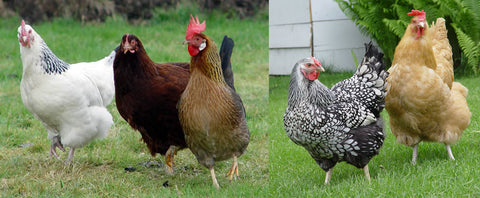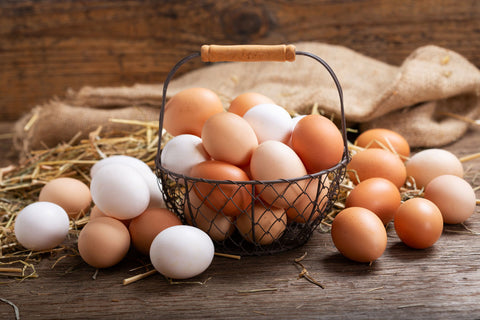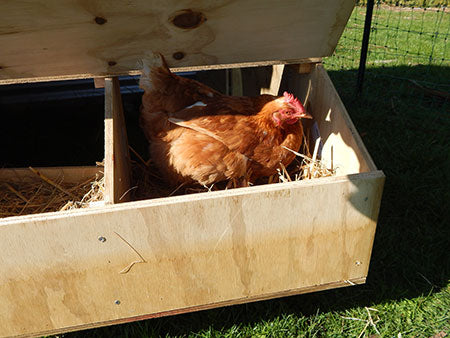There’s nothing quite like popping down the garden to fill up your egg basket for a tasty breakfast omelette and being greeted by the gentle clucking of your favourite feathered friends. If you assume a couple of hens will suffice for all your egg needs, then you’ll likely be popping off down the shop afterwards to stock up!
For beginner Chicken owners four or five hens would be the perfect number of hens. This will provide you with a lucrative number of eggs for an average family, allow you time to learn the ropes of poultry husbandry and give your chickens the socialisation they require to thrive.
Believe it or not chickens are social animals. Do you remember ever seeing a lonesome hen? If you’re thinking of adopting some new backyard egg producing pets then we’ve got some insightful tips to help you on your way to your daily breakfast delights.
How many chickens should I start with?
Chickens are extremely social creatures, these birds of a feather love to flock together. They’ve been known to create kinships with one another and are intelligent enough to recognise not only each other but us humans too. For this reason, two chickens are not quite enough to sustain this social nature. Three, four or even five would be a good number of chickens to start your flock. That way you can learn the ropes of becoming an egg farmer in an easy to manage fashion without compromising their need for interaction with each other.
That being said, if you have a larger family, you may want to venture a little further with a couple more hens. Six or eight chickens are likely to get you a good amount of fresh eggs stocked for the week without being too much of a challenge.

What is the best breed of chicken for beginners?
What defines a good breed of chicken will depend on what you want to raise your chickens for. Perhaps you want a friendly little egg machine that lives at the bottom of the garden, maybe you want to enjoy the variation of colours in your chooks and your eggs, or maybe you’re thinking of the whole farm to table cycle of regular chicken dinners, in which case you’ll want to include a rooster. Are you ready for that challenge?
GET A FREE COPY OF OUR CATALOGUE
Red or brown shavers
Red shavers, named for their rich reddish brown colour, are the most common egg producing breed in New Zealand. They are perfect for first-time chook owners due to their hardy and friendly personalities and their consistent large brown egg production.
Orpington
Orpington hens are extremely lovely hens in both looks and personality. They are a perfect addition to families with young children due to their friendliness. They lay large white eggs and are known for their ability to hatch out clutches of chicks at a time.
Leghorn
Leghorns are medium sized, white or cream in colour with striking large red wattles. They are relatively easy to care for and lay pure white eggs pretty consistently from spring through to autumn. They do like to take flight so you should keep this in mind when designing their chicken run.
Read more about the different chicken breeds and which one will best suit you in our article on Things you need to know before you get chickens.

How many eggs will my chickens lay?
A good hen will give you one egg a day, but this doesn’t mean they will definitely lay daily. Don’t be disappointed if your lay hen doesn’t produce every single day of the week. That’s why we recommend you get four or five lay hens, who can take the pressure off if one's not feeling up to it.
Four hens will give you roughly three or four eggs per day. Remember that most hens will have a break in the Autumn or winter for a few weeks. With these types of expectations you will be delighted when they produce a little more than you expected.
Can you mix different breeds of chickens together?
You can have a mixed flock of a variety of chicken breeds if you so wish. However, you would need to consider the temperament of each breed and whether they will meld well together. For example, some breeds can be noisy and dominant whereas others are calm and docile. You may not want to mix the two as it may cause conflict or stress in some birds.
In addition to the varying temperaments of chicken breeds, likewise some birds are hardier in colder weather and some do better in warmer weather. You may struggle to find optimal temperatures in your chicken coop for both breeds.
Mixing your chicken breeds is definitely a possibility but as a beginner in the egg or chicken farming field you will want to do your homework beforehand to ensure your chickens can live in harmony together.
Will my backyard chickens fly away?
Most chicken breeds can only fly about half a metre in the air and about 15 metres in distance at any one time. For this reason, plus the fact that they are domesticated animals who prefer to stay near their habitat, you shouldn’t have to worry too much about your chickens flying away.
Although your chickens will not typically choose to take flight or wander off your property, once they get used to the area and comfortable with their surroundings it’s not unheard of for them to become a little more daring with their exploration. The reason the term free-range chickens exist is due to their inherent sense of direction, which instinctively brings them back to safety.
What might make you nervous is the fact that they could take flight out of the chicken run only to be chased down by the neighbours dog or a wild cat. To avoid this panic-inducing thought, invest in a safe and durable chicken coop and hen house with our Outpost kitsets.
As well as ensuring your hens have a hardy house to keep them safe, you can prevent your chickens from flying away from their coop by ensuring their happiness. The main reason they are likely to venture out would be because their needs are not being met, i.e. they are hungry, cold, thirsty, uncomfortable or they perceive some kind of danger in the vicinity. As long as you can provide the comfort, safety, warmth and food they need they will have no desire to leave.
What is the best time of year to start raising chickens?
The best time to start raising chickens, well that would have to be Spring! Especially if you’re raising them from tiny fresh chicks. Spring is the best season to start raising chickens for many good reasons:
- Hens lay the healthiest eggs in spring - it’s the natural time to hatch and raise babies so they’re fighting fit by the time cooler months come around.
- Spring chicks develop better immunity due to the cooler weather keeping pathogens in check during their most vulnerable months on earth.
- Demand for chicks in the Spring means there will be a broader spectrum of breeds available to choose from.
- Chicks raised in the spring are more likely to lay eggs the following winter as they begin laying between 4-8 months of age.
- If your chicks are being shipped, they’re more likely to survive the journey in the warmer spring months.
- You’re more likely to be able to raise your chicks in natural light conditions if they’re born in the springtime.
With spring time coming upon us, you can identify the best spot in your garden for your chicken coop, procure your hen house and order your chicks just in time for the longer, warmer days.

How many nesting boxes does a chicken need?
Nesting boxes aren’t actually for sleeping chickens, that’s what the roosting perches are for; the nest boxes should only be for laying eggs. It’s a good idea to have at least one nesting box for every four chickens so if you’re starting out with five or six chickens, two nesting boxes would be perfect.
If you find yourself wondering about everything else you need to include when housing your chooks, look no further than our article on what a chicken coop needs.
How many chickens do you need to get a dozen eggs a week?
Egg consumption doesn’t end with the morning breakfast, any cake baking, quiche making or a sunny side up on pretty much anything adds a little extra wholesome protein to the diet. The number of eggs you get through will depend on the size of your family and how many eggs you eat a week but most importantly, how many your chickens lay over a seven day period.
Some chickens lay one egg on average a day but others may only lay a few times a week. It also depends on the time of year as some breeds don’t lay as often in the winter months. That’s another advantage to having a few more chickens in your flock. With three to four laying hens you’ll get an average of a dozen eggs a week.
How many chickens does a family of 4 need?
Let’s say you and your family each eat an average of one egg a day, whether that's two on one day and none the next. You would ideally need between four and six chickens producing those eggs for you. This way you’ll likely have some extra eggs during the productive summer months and will even out the lower production in the winter.
If you're new to the world of chicken raising you’re likely looking for a cosy, durable and optimally designed coop for your baby chooks. No worries, we’ve got you covered. Check out our most popular chicken coop design, the strong, relocatable hen house and get in touch with us today should you have any other questions regarding your new life’s calling.





